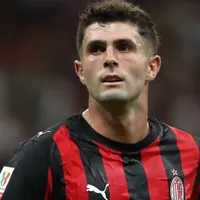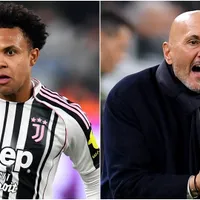Editor’s note: World Soccer Talk went back through our archives to look at TV viewership numbers for ESPN2’s coverage of the Premier League during the 2009/2010 season to compare it to NBCSN’s TV viewing numbers for the Premier League. A lot has changed in a decade. We take a closer look at the numbers to see what they reveal.
It’s been just over ten years since Fox Soccer Channel agreed to sublicense two Premier League games a weekend to ESPN2, a decision that in hindsight quickly elevated the exposure of the English top-flight division across the United States.
This was at the time a watershed moment for the Premier League, who had yet to really make their mark in the United States despite coverage being shared from August 2009 on ESPN2, Fox Soccer Channel and Setanta Sports.
ESPN2 acquired both the early Saturday morning kickoff (7:45 AM EST) and the Monday afternoon matches (3:00 PM EST) for the 2009-2010 season, time slots that had originally been held by Setanta Sports (who had sub-licensed those games from Fox Soccer Channel).
For fans of the Premier League in the United States, this was a massive deal. ESPN2 was far more accessible than Setanta, and the commentary team of Ian Darke and Steve McManaman would quickly form a tight bond with the American viewers — almost 10 months before Darke would become a cult hero in the States with his “Go, Go USA!” call after a Landon Donovan goal secured a late win against Algeria at World Cup 2010.
On the ESPN2 broadcasts, Darke and McManaman’s on-screen chemistry built an instant rapport with the audience that created the beginnings of a Saturday morning ritual. Soccer fans in the US would watch the games, for sure, but the viewing experience was heightened by the Darke-McManaman duo. Years later, NBCSN was able to introduce that Saturday morning concept to a whole new audience with their Premier League Mornings Live broadcasts. But the root of the success was ESPN2.
Another thing that ESPN2 pioneered that NBCSN copied was the way ESPN’s coverage began with the players in the tunnel, so you could see the pre-match build-up before the footballers were led out to the pitch.
SEE MORE: Schedule of Premier League games on US TV and streaming
Going back through the World Soccer Talk archives of ESPN2’s Premier League games in the 2009/10 season, the broadcasts averaged 262,697 across 30 games throughout the season compared to NBC Sports’ average of 457,000 during the 2018/19 season (which represents a 73.9% increase in 10 years; albeit Premier League games are helped by being available on over-the-air NBC once a week). In comparison around the same time, Fox Soccer Channel was averaging 142,000 viewers per game, which was a sharp rise from an average of 84,000 in 2008.
Looking at the ESPN2 numbers below, the disparity in the numbers between 2009 and 2019 is overwhelming. NBC Sports’ acquisition of full Premier League rights back in 2013 gave American viewers unparalleled and unprecedented access to the world’s most popular soccer league. Not only did they introduce their version of Ian Darke in MLS broadcast veteran Arlo White, but they also introduced us to full pre- and post-match studio programming, plenty of digital content, and several esteemed ex-pros as pundits.
The comprehensive nature of NBC’s coverage (which is ever-evolving, as supported by the introduction of NBC Sports Gold last season) is evident in their viewing numbers.
ESPN2 Premier League viewing data from 2009/10 season
| RANK | TEAMS | DATE | DAY/TIME | TV RATINGS |
|---|---|---|---|---|
| 1 | Liverpool v Aston Villa | 8/24/2009 | Monday 3pm | 398391 |
| 2 | Portsmouth v Man United | 11/28/2009 | Saturday 10am | 396995 |
| 3 | Wigan v Man United | 8/22/2009 | Saturday 10am | 374799 |
| 4 | Fulham v Aston Villa | 1/30/2010 | Saturday 10am | 355000 |
| 5 | Arsenal v Spurs | 10/31/2009 | Saturday 8:45am | 325187 |
| 6 | Everton v Man United | 2/20/2010 | Saturday 7:45am | 325000 |
| 7 | Chelsea v Man City | 2/27/2010 | Saturday 7:45am | 324000 |
| 8 | Man City v West Ham | 9/28/2009 | Monday 3pm | 293600 |
| 9 | Liverpool v Everton | 2/6/2010 | Saturday 7:45am | 290000 |
| 10 | Portsmouth v Burnley | 12/5/2009 | Saturday 7:45am | 278078 |
| 11 | Portsmouth v Liverpool | 12/12/2009 | Saturday 7:45am | 276160 |
| 12 | Stoke City v Liverpool | 1/16/2010 | Saturday 7:45am | 273000 |
| 13 | Portsmouth v Everton | 9/26/2009 | Saturday 7:45am | 270927 |
| 14 | Bolton v Spurs | 10/3/2009 | Saturday, 10am | 265508 |
| 15 | Spurs v Sunderland | 11/7/2009 | Saturday, 10am | 258831 |
| 16 | Chelsea v Burnley | 8/29/2009 | Saturday 7:45am | 253934 |
| 17 | Liverpool v Burnley | 9/12/2009 | Saturday, 10am | 253779 |
| 18 | Aston Villa v Man City | 10/5/2009 | Monday, 3pm | 248956 |
| 19 | Birmingham v Chelsea | 12/26/2009 | Saturday, 7:45am | 246000 |
| 20 | Liverpool v Man City | 11/21/2009 | Saturday, 7:45am | 236247 |
| 21 | Wolves v Man City | 12/28/2009 | Monday, 2:45pm | 219000 |
| 22 | Man City v Blackburn | 1/11/2010 | Monday, 3pm | 209547 |
| 23 | Fulham v Hull | 10/19/2009 | Monday 3pm | 209207 |
| 24 | Aston Villa v Chelsea | 10/17/2009 | Saturday 7:45am | 206886 |
| 25 | Wolves v Aston Villa | 10/24/2009 | Saturday 7:45am | 204882 |
| 26 | Stoke City v Wigan | 12/12/2009 | Saturday 7:45am | 202000 |
| 27 | Burnley v Sunderland | 9/19/2009 | Saturday 7:45am | 199380 |
| 28 | Liverpool v Birmingham | 11/9/2009 | Monday 3pm | 182138 |
| 29 | Chelsea v Hull | 8/15/2009 | Saturday 7:45am | 164485 |
| 30 | Sunderland v Stoke | 2/1/2010 | Monday 3pm | 139000 |
Overall, the viewing numbers from a decade ago represent a few interesting developments. Firstly, it shows how far the Premier League has come on American television versus today’s comprehensive NBC package. Second, it also offers an interesting look at what teams mattered, and for what reasons, when Premier League fandom in the United States was largely still in a primitive stage.
Third, we always get asked how the Premier League TV viewing numbers compare to MLS, the third most popular soccer league on US television. In 2009, the average viewing number for the first 14 MLS on ESPN2 was 251,000 — slightly less than the 262,697 average for the Premier League around the same time.
As time has gone on, the gulf in TV ratings between the two leagues has widened. During the 2018 Major League Soccer regular season, viewership was down on both ESPN and FOX Sports 1 with both networks failing on multiple occasions to draw more than 200,000 viewers to their MLS broadcasts.
SEE MORE: Access our archive of soccer TV ratings from 2007 to present
Some of the other interesting observations to be had from our 2009-10 data include:
• The opening game of ESPN2’s slate (Chelsea vs. Hull City) had the second lowest ranking out of our sample size (although the announcement that ESPN2 would broadcast the game only was reported on the night before after World Soccer Talk got the scoop). That season, only a not-so-mouthwatering early February clash between Sunderland and Stoke fared worse.
• ESPN2’s highest viewership took place just 9 days later for Liverpool against Aston Villa (398,391 viewers). Perhaps ESPN2 needed more time to get the word out about their coverage.
• Aston Villa are certainly the surprise package of these ratings. Villa finished in a Europa League spot in 2009-10, and inexplicably featured in two of the top five most-watched matches. A reason for this? American born players. Villa’s starting goalkeeper was American Brad Friedel, who started all 38 games for his club in 09-10.
• The emphasis on Americans extended past just Aston Villa. The only match in the top five to not feature a “Big Six Club” (Man United/City, Chelsea, Arsenal, Liverpool, Spurs) was Fulham vs. Aston Villa, which pitted Friedel vs. compatriot Clint Dempsey.
• There was also an interesting (and contrasting) emphasis on the top two clubs in the division. The Manchester United effect was evident. The Red Devils, European juggernauts at the time, featured in three matches on ESPN2, finishing second, third, and sixth place in the ratings. United’s global brand was likely a big reason why this deal was a coup for ESPN2.
• Chelsea, on the other hand, actually won the league in 2009-10, pipping United to the title by just one point. Their match ratings, however, fared far worse: they came up seventh, 16th, 19th, 24th, and 29th, with their highest viewed match being a home fixture against a then up-and-coming Manchester City team at Stamford Bridge.
• A final observation: Arsenal are the great variable in all this. The Gunners appeared in just one match on ESPN2, a Halloween North London Derby versus Spurs. That match finished fifth highest in terms of TV viewing numbers. Other big six clubs had plenty of exposure, but one has to wonder how Arsenal would have fared ratings wise if given more games.














